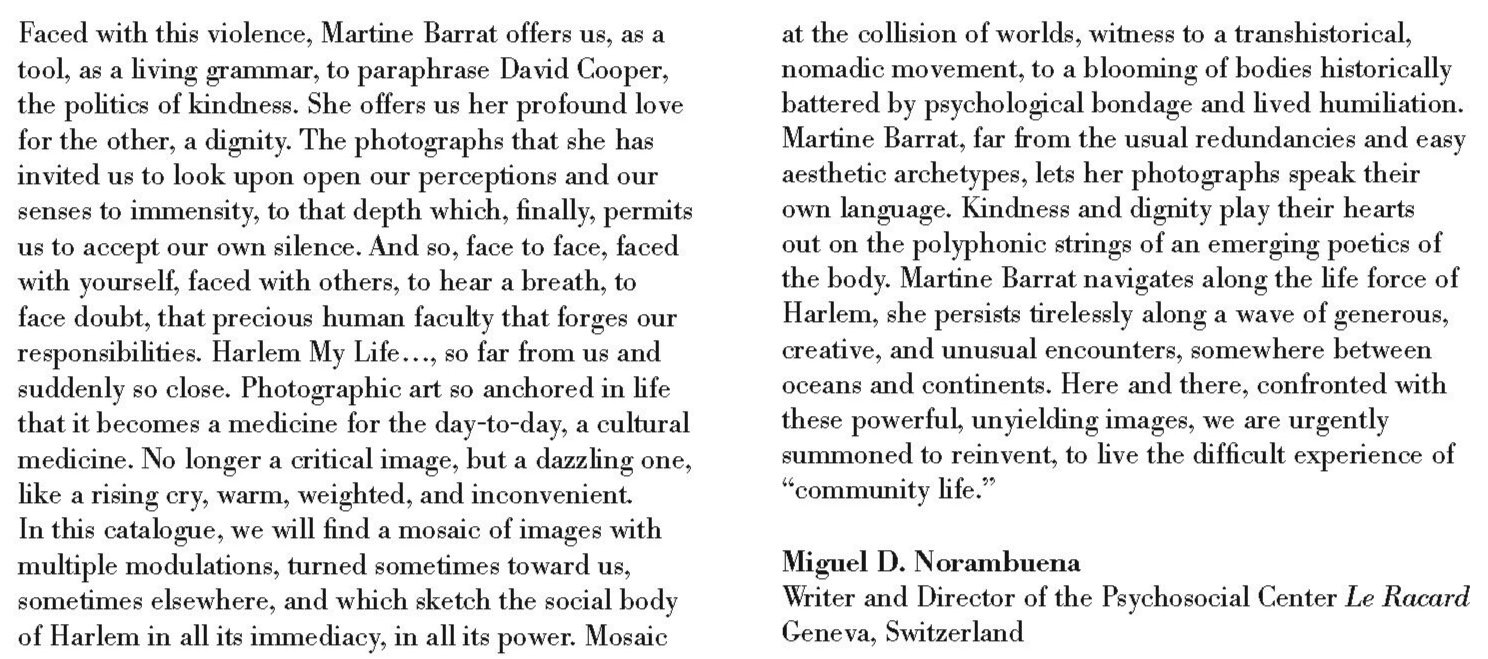MIGUEL NORAMBUENA
was a social psychologist and author.
Harlem, or the Poetics of the Body
The photographs of Martine Barrat submit to us an exercise of perception that is out of the ordinary. In effect, today we have become more and more accustomed to imaginary models imposed on us by the producers of cultural marketing. These models, oversimplified, are bound to images torn from their contexts and sociopolitical realities, and subjected to market forces, to an ugly, hollow esthetic. A veritable poison to imagination and creativity, these forces all too often transform the immense domain of the arts into a feeble and inoffensive vector of (vehicle for) esthetic, social, and political innovation, and engenders the major pandemic that is the sterilization of creative potential. However, with her photographs, Martine Barrat shatters the somnolescence of our senses, she launches us toward a more turbulent space, and roads less traveled.
Lured from the realm of mercantile clichés, exposed to a permanent course of intensive variation. we are thrown into the powerful world of Harlem. into its life. This life so far removed from our own. forces us to revisit our understanding of the world and of the body, it brings us closer to this extraordinary vitality, to this mighty/ grand/ powerful and exceptional mode of existence. This life is a desire, a giddy beauty carried aloft by all these evolving points of view. Here, the unhealing wound of systemic poverty, which infects the social body shamelessly and in plain sight, is transformed into an art of political resistance. Or rather, an art that recreates its bonds with the political vocation of art: the political art of joy, the art of giving. Martine Barrat, by her overwhelming gesture, by her incessant efforts to persevere in capturing these forces, has developed a politics of the street, of progress, of effort, of dance, of breathing: an ethics of movement. And looking at these beautiful images, hearing the sublime music that radiates out from them. it is difficult to dim the feeling of revolt they awaken in us when we are confronted with the reality of this "self- hatred" that, propagated by a false humanism, continues to contaminate minds. Martine Barrat inaugurates the joyous affirmation of "becoming other," so present in Harlem. She is truly a cartographer of the senses: with greatest care she folds and unfolds the wandering paths, the trajectory-narratives, and with each roll of the dice, she reinvents history. She recalls us to a free and inventive history, free because it is carried aloft by the joy of Harlem. A whole world flows from the inhuman violence. the unbearable precarity, and the indifference of a society intoxicated by a totalizing and oppressive sense of reason.
Faced with this violence, Martine Barrat offers us, as a tool, as a living grammar, to paraphrase David Cooper, the politics of kindness. She offers us her profound love for the other, a dignity. The photographs that she has invited us to look upon open our perceptions and our senses to immensity, to that depth which, finally, permits us to accept our own silence. And so, face to face, faced with yourself, faced with others, to hear a breath, to face doubt, that precious human faculty that forges our responsibilities. Harlem My Life..., so far from us and suddenly so close. Photographic art so anchored in life that it becomes a medicine for the day-to-day, a cultural medicine. No longer a critical image, but a dazzling one, like a rising cry, warm, weighted, and inconvenient. In this catalogue, we will find a mosaic of images with multiple modulations, turned sometimes toward us, sometimes elsewhere, and which sketch the social body of Harlem in all its immediacy, in all its power. Mosaic at the collision of worlds, witness to a transhistorical, nomadic movement, to a blooming of bodies historically battered by psychological bondage and lived humiliation. Martine Barrat, far from the usual redundancies and easy aesthetic archetypes, lets her photographs speak their own language. Kindness and dignity play their hearts out on the polyphonic strings of an emerging poetics of the body. Martine Barrat navigates along the life force of Harlem, she persists tirelessly along a wave of generous, creative, and unusual encounters, somewhere between oceans and continents. Here and there, confronted with these powerful, unyielding images, we are urgently summoned to reinvent, to live the difficult experience of “community life."
Miguel D. Norambuena
Writer and Director of the Psychosocial Center Le Racard
Geneva, Switzerland

